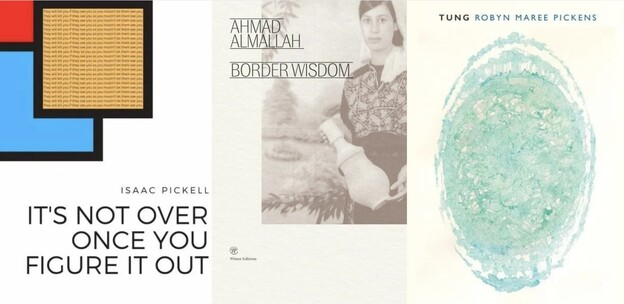
Visualizing the future tense
Orchid Tierney

Reviews Editor Orchid Tierney returns with capsule reviews of It’s Not Over Once You Figure It Out by Isaac Pickell, Border Wisdom by Ahmad Almallah, and Tung by Robyn Maree Pickens.
It’s Not Over Once You Figure It Out, Isaac Pickell (Black Ocean, 2023)
It’s Not Over Once You Figure It Out is a voyage through the biracial experience where shade is always on the horizon of an embodied life: “all she can say is don’t live a dim life just because you were lucky enough to be born so bright.” Pickell navigates with great deliberation the assumptions a body carries, the violence of whiteness, and the stories that are not told. “there is so much beauty,” writes Pickell, “& cruelty & we have // not imagined / the half of it.” Pickell holds up Saidiya Hartman’s claim to the light that “every generation confronts the task of choosing its past” as he explores what it means to be shaded and visible in anti-Black world: “When I got the talk she made me // promise to remember you can / always be invisible.”
Border Wisdom, Ahmad Almallah (Winter Editions, 2023)
Reading Almallah’s haunting collection in 2024, it is impossible not to feel the loss and pain of genocide, the slow violence that unfolds each day with rapid intensity in the Gaza Strip. Border Wisdom grapples with this loss through a bilingual lens of Arabic and English, through life and death that surface with the loss of a mother and a mother tongue: “in this land of new beginnings / I own no language.” Translation and malformations become necessary strategies to refuse linguistic, social, and political borders. “I tell you this translaformation is more accurate a / translation than I ever imagined,” writes Almallah. This collection is a beautiful elegy for a mother and a mother tongue.
Tung, Robyn Maree Pickens (Otago University Press, 2023)
Tung underscores the watery relationships between sound, the more–than–human world, and poetic language on the cusp of fragmentation. Working against a narrative of ecological devastation — while keenly aware of the Anthropocene’s sharp edges — Pickens’ collection is full of movement, music, and affective possibilities. “blessings on the light of the tape,” writes Pickens, “and the light of the frame and the light of the plum.” Line and linguistic experimentation drive the poet’s engagement with sound and the more–than–human world: “Okay / o / body ough /birds filling / the bay.” Tung reminds us of the poem’s power to imagine our stunningly rich world.